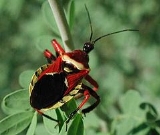
Apiomerus
Encyclopedia
Apiomerus is a conspicuous, brightly colored genus of assassin bugs belonging to the family Reduviidae
. The species can be found in the United States
ranging into tropical America
. The common name bee assassins derives from their frequent habit of sitting and waiting upon flowers and taking bee
s as prey. The bright colors are aposematic likely a warning to larger predators that a painful bite
can be delivered.
Many species of this genus have a sticky resin pad located on their dorsal abdomen. The resin is thought to be derived from plant material and may play a role in defending eggs from predation, especially by ants.
The genus presently consists of about 110 described species (Schuh and Slater 1995).
Reduviidae
Reduviidae is a large, cosmopolitan family of predatory insects in the suborder Heteroptera...
. The species can be found in the United States
United States
The United States of America is a federal constitutional republic comprising fifty states and a federal district...
ranging into tropical America
Americas
The Americas, or America , are lands in the Western hemisphere, also known as the New World. In English, the plural form the Americas is often used to refer to the landmasses of North America and South America with their associated islands and regions, while the singular form America is primarily...
. The common name bee assassins derives from their frequent habit of sitting and waiting upon flowers and taking bee
Bee
Bees are flying insects closely related to wasps and ants, and are known for their role in pollination and for producing honey and beeswax. Bees are a monophyletic lineage within the superfamily Apoidea, presently classified by the unranked taxon name Anthophila...
s as prey. The bright colors are aposematic likely a warning to larger predators that a painful bite
Bite
A bite is a wound received from the mouth of an animal, including humans.Animals may bite in self-defense, in an attempt to predate food, as well as part of normal interactions. Other bite attacks may be apparently unprovoked. Self inflicted bites occur in some genetic illnesses such as...
can be delivered.
Many species of this genus have a sticky resin pad located on their dorsal abdomen. The resin is thought to be derived from plant material and may play a role in defending eggs from predation, especially by ants.
The genus presently consists of about 110 described species (Schuh and Slater 1995).
Partial species list
- Apiomerus crassipesApiomerus crassipesThe bee assassin, Apiomerus crassipes, is an insect that feeds on bees and ants. It is found throughout North America. Bee assassins can fly, and stalk flowering plants that are visited by bees, flies, and other pollinating insects...
(Fabricius, 1803) - Apiomerus flaviventrisApiomerus flaviventrisThe bee assassin, Apiomerus flaviventris, is an insect that feeds on bees. It is found in arid and semi-arid southwestern North America. This bee assassin is known to extract plant resins and apply them as defensive chemicals to its eggs, protecting the eggs from predation, especially by ants but...
Herrich-Schaeffer, 1846 - Apiomerus hirtipes (Fabricius, 1787)
- Apiomerus immundus Bergroth, 1898
- Apiomerus longispinis Champion, 1899
- Apiomerus moestus Stål, 1862
- Apiomerus pictipes Herrich-Schaeffer, 1846
- Apiomerus pilipesApiomerus pilipesThe bee assassin, Apiomerus pilipes, is an insect that feeds on bees. It is found in South America and reported from Venezuela, Colombia, French Guyana, and Brazil...
Fabricius, 1787 - Apiomerus repletus Uhler, 1876
- Apiomerus spissipes (Say, 1825)
- Apiomerus subpiceus Stål, 1862
External links
- Bugguide hosted by Iowa State University Entomology
- Research of Apiomerus Systematics at UC Riverside
- http://nature.berkeley.edu/~dchoe003/index4.htm

